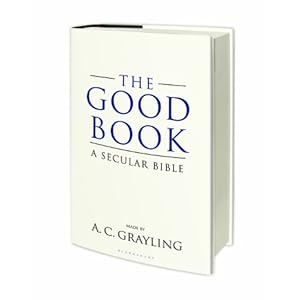 book ‘The Good Book’ – a humanist bible. There is some Bible-bashing in the first half, and typifying the Biblical God as someone who commits massacres. There is also a little envy – yes, the Bible has been inspiring (especially the non-religious bits), well edited and invented chapter and verses. These are the things Grayling will try emulate in his volume.
book ‘The Good Book’ – a humanist bible. There is some Bible-bashing in the first half, and typifying the Biblical God as someone who commits massacres. There is also a little envy – yes, the Bible has been inspiring (especially the non-religious bits), well edited and invented chapter and verses. These are the things Grayling will try emulate in his volume.How should we reply:
- welcome someone who is trying to raise the tone of humanist discourse?
- remember that imitation is the sincerest form of flattery?
- feel that someone else is stealing our best lines?
I ask:
- is this for the ‘ordinary person’? ‘We must take full responsibility for ourselves and aim to live with personal nobility.’ Well yes, but try telling that to Jamie Oliver’s Dream School-ers and see how you get on, Professor.
- is this all about will-power ‘we must seek self-mastery’? How does that happen?
- is there any place in this system for objective morality? What does ‘be true to ourselves’ really mean?
- we shouldn’t see the best wisdom of the secularists as necessarily dubious. From a doctrine of God’s image in humanity, flows a presumption that truth is everywhere. There are co-belligerants against materialism, and selfishness.
- we need to take up the challenge to respond in action. Not just talk about God (Grayling would not give any ground in philosophical debate). No we should be demonstrating that our gospel is to everyone’s advantage, that it doesn’t result in crippling guilt (‘was I true to myself today?’) but in the atmosphere of divine love and affirmation truly is freeing. We believe that the Spirit is working inside us, changing who we are – why isn’t that more obviously true?
- and of course we need to teach the Bible in a way that leads people to respect it, to see deeper into its depths and find more than their best ideas reflected back.
No comments:
Post a Comment